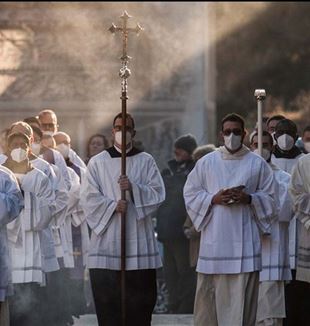
"We implore from God that peace which men and women are incapable of building by themselves"
The homily of Pope Francis during the Ash Wednesday Mass, read by Cardinal Pietro Parolin in the Basilica of Santa Sabina, Rome, on March 2, 2022.Today, as we embark on the Lenten season, the Lord says to us: “Beware of practicing your piety before others in order to be seen by them; for then you have no reward from your Father in heaven” (Mt 6:1). It may be surprising, but in today’s Gospel, the word we hear most frequently is reward (cf. vv 1.2.5.16). Usually, on Ash Wednesday, we think more of the commitment demanded by the journey of faith, rather than the prize that is its goal. Yet today Jesus keeps returning to that word, reward, which can appear to be the reason for our actions. Yet within our hearts, in fact, there is a thirst, a desire for a reward, which attracts and motivates us.
The Lord, however, speaks of two kinds of reward to which our lives can tend: a reward from the Father and, on the other hand, a reward from others. The first is eternal, the true and ultimate reward, the purpose of our lives. The second is ephemeral, a spotlight we seek whenever the admiration of others and worldly success become the most important thing for us, our greatest gratification. Yet the latter is merely an illusion. It is like a mirage that, once we get there, proves illusory; it leaves us unfulfilled. Restlessness and discontent are always around the corner for those who look to a worldliness that attracts but then disappoints. Those who seek worldly rewards never find peace or contribute to peace. They lose sight of the Father and their brothers and sisters. This is a risk we all face, and so Jesus tells us to “beware”. As if to say: “You have a chance to enjoy an infinite reward, an incomparable reward. Beware, then, and do not let yourself be dazzled by appearances, pursuing cheap rewards that disappoint as soon as you touch them”.
The rite of receiving ashes on our heads is meant to protect us from the error of putting the reward received from others ahead of the reward we receive from the Father. This austere sign, which leads us to reflect on the transience of our human condition, is like a medicine that has a bitter taste and yet is effective for curing the illness of appearances, a spiritual illness that enslaves us and makes us dependent on the admiration of others. It is a true “slavery” of the eyes and the mind (cf. Eph 6:6, Col 3:22). A slavery that makes us live our lives for vainglory, where what counts is not our purity of heart but the admiration of others. Not how God sees us, but how others see us. We cannot live well if we are willing to be content with that reward.
The problem is that this “illness of appearances” threatens even the most sacred of precincts. That is what Jesus’ tells us today: that even prayer, charity and fasting can become self-referential. In every act, even the most noble, there can hide the worm of self-complacency. Then our heart is not completely free, for it seeks, not the love of the Father and of our brothers and sisters, but human approval, people’s applause, our own glory. Everything can then become a kind of pretense before God, before oneself and before others. That is why the word of God urges us to look within and to recognize our own hypocrisies. Let us make a diagnosis of the appearances that we seek, and let us try to unmask them. It will do us good [...]
Continue reading on vatican.va